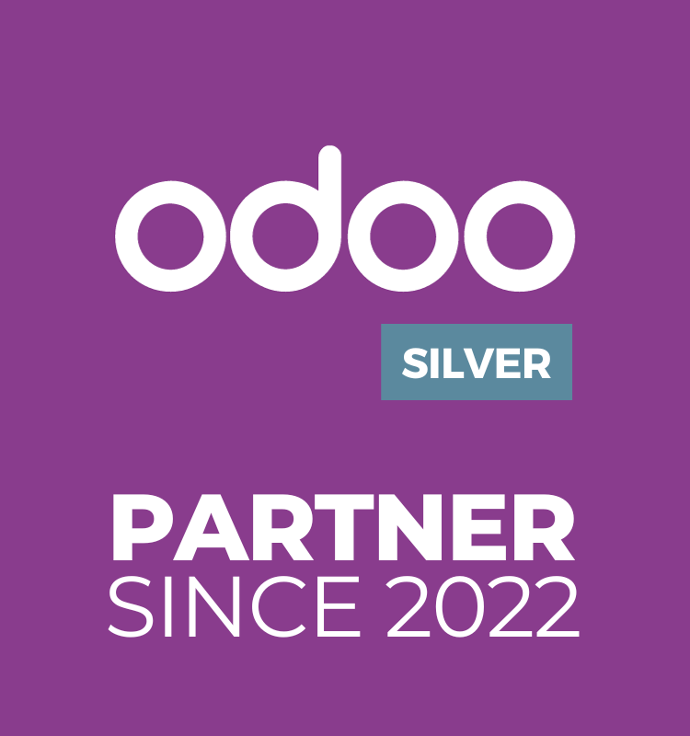OdooIntegrationERP
Odoo is a comprehensive suit of business applications covering multiple functions and requirements. This includes elements such as accounting, inventory management, manufacturing, project management and more. Acting as a powerful piece of software that helps businesses streamline their operations and improve efficiency, further integration has been a hot topic for both existing Odoo customers and potential companies looking at Odoo a as possible business solution.
Let's take a look at just FIVE ways to connect Odoo to other integrations.
Looking back to Odoo 17, one of the biggest announcements was Odoo's integration into WhatsApp. Coming out of the Keynote by Odoo CEO Fabien, Odoo is now fully compatible with WhatsApp. A fantastic out-of-the-box integration to consider for users.
You will be able to level up your customer experience by engaging with your customers in the way they like. Not to mention, customers benefit from a 520% better open rate on marketing communications.
The integration includes:
- Customer initiated discussions
- Initiate with templates
- Bulk messaging
- Connect any documents such as events, quotations and invoices
- Chat in Discuss
- Dynamic placeholders
- Marketing automation
- Preset answers (buttons)
- Send documents such as maps and contacts
- Emoji reactions
Super easy for all salespeople through one user interface. Selling has just become much more accessible.
If you have not heard of WhatsApp before - it is an instant messaging and voice-over-IP app that further pushes users to send messages and conduct calls while also ensuring that media is shared regarding content. Not to mention that you can also enlist in 'WhatsApp Business' to communicate. Also, including documents and providing support.
It is also highly recommended to set up multiple WhatsApp accounts for different departments within your business. This helps assist internal teams such as the help desk and 'Sales' in collaborating on other channels for clarity.
With the Odoo WhatsApp idea in mind, any user/organisation can connect a WhatsApp Business Account (WABA) to an Odoo database, allowing you to then do the following:
- Receive and reply to WhatsApp messages directly from an Odoo database
- Create new templates that use dynamic variables
- Quotations from the Sales app
- Receipts and invoices
- Alignment for tickets in the Events app
It is also important to mention that WhatsApp is now owned by Meta. You know - those guys who made Facebook. With Meta being the parent company of WhatsApp, it is a common tool used across various countries. It also allows for the further integration of a Meta account via an API connection.
To further understand how to set up WhatsApp for Odoo you can take a look below:
Odoo's Extensive App Store
An extra mention to the Odoo App Store, which offers a wide range of third-party apps that can be used to extend the functionality of Odoo and connect it with other apps. This includes finding apps, even down to website themes, e-commerce, connectors, payment gateways and marketing automation tools, that are available for all customers.
Customer Integration Concerns
If you do follow the 'Custom Integration' route and you have specific requirements as a business, then you need to be aware of the 'out-of-box' methodology that we highly recommend here at Gravitai as a best practice.

While we support custom integrations, and they can be incredible - having customisations opens you up to some possible considerations that you need to make as a business enlisting Odoo.
- Do I have an internal team to support the integrations?
- Will these customisations affect future upgrades?
- Can this customisation be done within Odoo as a platform?
As an Odoo partner, Gravitai can assist in these decisions. If this is something of concern, contact us to understand your requirements. This approach requires more technical expertise and development resources but can provide extreme flexibility.
Odoo Shopify Integration
While we are massive advocates for the e-commerce platform within Odoo, we do understand that it can take time to either migrate or deal with complexities. Shopify is a highly adapted platform, and for that reason, connecting to Odoo is critical.
It is used by businesses across the globe.
If e-commerce platforms are of interest, then I would suggest taking a look at a recent blog comparing the systems when it comes to websites.
The Odoo Shopify Connector App is the easiest option for most users. It can bring many benefits to users or clients as a stop-gap before bringing everything in-house regarding Odoo:
- Streamline Order Management: By integrating Odoo with Shopify, you can easily manage orders, shipments and returns from one central location. You can also track the status of orders, manage inventory, and update product information in real-time.
- Sync Customer Information: Integrating Odoo with Shopify allows you to sync customer information between the two platforms. This means that customer data, including names, addresses, and order history, can be easily accessed from both platforms.
- Centralise Product Information: By integrating Odoo with Shopify, you can centralise product information between the two platforms. This makes it easy to update product information, including descriptions, pricing, and inventory levels, while ensuring that it's consistent across all channels.
- Automate Accounting & Finance: Integrating Odoo with Shopify can streamline accounting and finance processes. You can automatically create invoices, track payments, and reconcile accounts. This can leave you saving time and reducing errors.
- Improve Communication & Collaboration: Integrating Odoo with Shopify can improve communication and collaboration between different departments or teams. For example, Sales and Marketing teams can access order data and customer information to better target their efforts.
As a stop-gap for Odoo e-commerce, it does not get much better than Shopify.
Odoo API Integration
Odoo provides a robust set of APIs that enable integration with other applications and services via XML-RPC or JSON-RPC web services.
These APIs support data and process integration and provide a simple way to access and manipulate data within Odoo.
XML-RPC and JSON-RPC are Remote Procedure Call (RPC) protocols that enable applications to communicate with each other over the internet. XML-RPC uses XML to encode data and provides a lightweight way to exchange data between applications. JSON-RPC uses the JSON format and is more efficient than XML-RPC.
Using these protocols, you can create scripts that automate data exchange between Odoo and other applications. For example, you can use a script to import customer data from a third-party CRM into Odoo or to export product information from Odoo to an e-commerce platform.
The Odoo API provides a wide range of functions that enable you to create, read, update and delete data in Odoo. You can use these functions to integrate Odoo with other applications and automate business processes.
Here are some examples of what you can do with the Odoo API:
- Create new customers, orders, invoices and payments in Odoo from external systems
- Retrieve customer, product, and sales data from Odoo and display to external applications
- Update product pricing, inventory levels and other data in Odoo from external systems
- Automate business processes, such as generating invoices, sending email notifications and triggering actions based on specific events
Integrating Odoo with other applications via XML-RPC or JSON-RPC web services or scripts provides a simple and efficient way to exchange data and automate business processes. This approach suits businesses requiring custom integrations and technical expertise to develop and maintain their scripts.
Odoo PayPal Integration
One popular payment gateway that businesses can rely on with Odoo is PayPal which is widely known.
If you're using Odoo ERP for you business operations, integrating it with PayPal can provide you with a seamless and automated way to handle payments, streamline your processes, and enhance customer experience within your business.
The Odoo API provides a comprehensive set of tools and functions that allow you to connect and interact with PayPal's payment gateway seamlessly. With the Odoo API, you can easily send and receive payment information, update payment statuses, and manage refunds, all within your Odoo ERP system.
This API allows for real-time synchronisation of payment data, ensuring accurate and up-to-date information in both Odoo ERP and PayPal.
If payment processing is something you are interested in - take a look at this:
Integrating Odoo with a payment gateway like PayPal is a straightforward process. Here is a general overview of the steps involved:
- Obtain PayPal API Credentials: Before you can integrate PayPal with Odoo, you need to obtain API credentials from PayPal. You will need to create a PayPal Developer Account and then create an application that allows you to access the PayPal API. Once you have created your application, you will receive API credentials, including an API username, password, and signature.
- Install and Configure PayPal Payment Module: Once you have your PayPal API credentials, you need to install and configure the PayPal Payment Module in Odoo. The PayPal Payment Module is a free module that can be downloaded from the Odoo App Store. Once installed, you will need to enter your PayPal API credentials in the module's configuration settings.
- Set Up Payment Methods: Once the PayPal Module is installed and configured, you can set up payment methods in Odoo that use PayPal as the payment gateway. You can set up different payment methods for different products or services, and you can customise the payment method options, such as the currency, payment type, and transaction fees.
- Testing The Integration: Once you have set up the PayPal integration in Odoo, it's essential to test to ensure that it's working correctly. You can create a test order in Odoo and complete the payment process using PayPal Sandbox, a testing environment provided by PayPal. This allows you to ensure that the integration is working correctly before accepting live payments.
Integrating PayPal with Odoo ERP can provide your e-commerce business with a seamless and efficient payment processing system. With the Odoo API, the integration process is made easy, allowing for real-time synchronisation of payment data between Odoo ERP and PayPal. This integration offers streamlined payment processing, enhanced business visibility, flexible payment options, and a secure payment gateway.
Customers can make payments using PayPal directly from your e-commerce website, and the payment information is automatically synced with Odoo ERP. This eliminates the need for manual data entry and reduces the risk of errors, saving time and effort.
Odoo ERP also automatically updates the payment status in real-time, allowing you to track payments and manage refunds more efficiently.
Odoo and eBay
eBay is a popular online marketplace with millions of active buyers and sellers for those who have not come across the platform before. Integrating with Odoo ERP and eBay can provide numerous benefits for your e-commerce business, including:
- Inventory Control: Odoo provides comprehensive inventory management features that allow you to track and manage your inventory levels in real-time. When integrated with eBay, Odoo ERP can automatically update your inventory levels across all your sales channels, including eBay, ensuring accurate inventory control and preventing overselling.
- Centralised Order Management: With Odoo eBay integration, all your eBay orders can be automatically synced with your Odoo ERP system, allowing you to manage all your orders in one central location. You can track orders, update order statuses, and process orders more efficiently, reducing the risk of errors and delays.
- Product Listing Management: Listing products on eBay can be time-consuming and tedious. With Odoo eBay integration, you can easily manage your product listings from your Odoo ERP system. You can create, update, and delete product listings, manage product information, and synchronise product data between Odoo ERP and eBay, saving you time and effort.
- Streamlined Order Fulfilment: Odoo ERP offers robust order fulfilment features, including packing, shipping and tracking. When integrated with eBay, Odoo ERP can automatically generate shipping labels, update order status with tracking information, and streamline the entire order fulfilment process, saving you time and reducing manual errors.
- Enhanced Business Visibility: With Odoo, you can gain insights into your e-commerce business performance through comprehensive reporting and analytics features. By integrating eBay sales data with Odoo, you can get a holistic view of your business, including sales trends, order metrics, and customer data, empowering you to make data-driven decisions and optimise your business operations.
Made easy all through the power of Odoo and eBay API connector available.
How Do I Integrate Odoo And eBay?
Integrating Odoo ERP with eBay is made easy through the Odoo Application Programming Interface (API), which allows communication between different software systems.
Integrating Odoo ERP with eBay can significantly streamline your e-commerce business processes.
The Odoo API provides a seamless and efficient way to integrate both platforms, allowing for real-time data synchronisation and automation of key tasks. With enhanced business visibility through comprehensive reporting and analytics, you can make data-driven decisions and optimise your e-commerce operations for improved efficiency and growth.
You can take a look at the eBay configuration set-up below.
By leveraging the power of Odoo integration, businesses can streamline their operations, reduce manual data entry, and gain better insights into their processes.
As a final note - you should always take integrations with a pinch of salt. Customisations come with risks and, I highly suggest you consult with a partner before investing heavily into any further integrations with your business.
It is important to carefully consider the specific needs and resources of your business when choosing an integration method and seek expert advice if necessary to ensure successful implementation.
NEED HELP WITH INTEGRATIONS?
We know that it can be hard to understand the difficult realm of Odoo integrations. Consult us as a partner.
Odoo consulting FAQ's
There are some guidelines which you can follow to ensure best practice when it comes to integrations in general but specifically through Odoo. Documentation is critical, and Odoo has that in bundles. You can take a look at the 'Odoo 17 Documentation' to gain an excellent guide understanding. I would also refer to the community and resources that are available online.
That is a fantastic question. It is more of the unknown. If you run down the route of customisations, you also have to consider factors like an increase in costs, further developer resources and even an increase in time for the integration. It is also essential to think about whether the integration will still be compatible when upgrading to the next Odoo version. You may have to revisit the integration again.
Yes, they do. You can find specific apps tailored towards your requirements and also pre-built modules in your Odoo environment. There is an app for every use case.
Third-party integration is where a business or organisation uses a third-party API to power a specific integration with another business's application or web service for use.
An API integration is the main connection between two or possibly more applications in use. Via the API, it let's those systems exchange data to keep it in sync, enhance productivity and drive revenue.
Yes, and we could be here all day if we started to list them off. Being an ERP, Odoo caters to a range of departments and requirements meaning that pre-Odoo businesses are operating on several platforms. With the aim of bringing everything into one platform, Odoo also caters towards supporting integration with apps like Zoho, CRMs, QuickBooks, Google Workspace, Microsoft 365 and plenty of others.
Odoo is written in a programming language called Python. They also used the PostgreSQL database management system. This is due to Odoo being a large system it allows developers to ensure code quality and consistency while enforcing coding standards.
I would highly recommend subscribing to 'Drinking The Purple Juice'. The number one newsletter for upcoming Odoo news, events, topics and further community input regarding on-going updates and events. Be sure to drop by and say hello!

